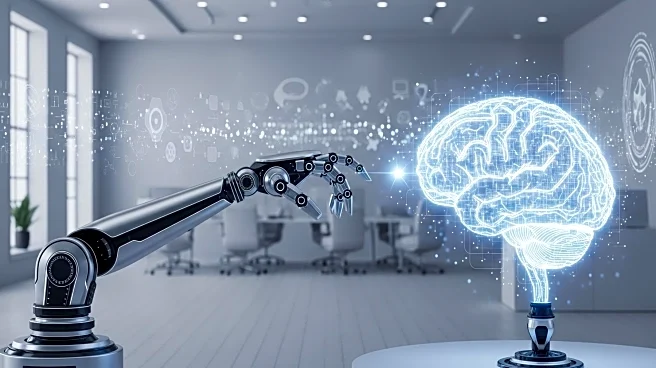What is the story about?
What's Happening?
Federal Reserve Chair Jerome Powell has highlighted the challenges faced by Gen Z graduates entering the workforce, particularly in the context of AI's growing influence. During a Senate Banking Committee session, Powell noted that AI could initially replace many jobs, affecting entry-level positions. This concern is underscored by recent labor statistics showing higher unemployment rates among recent graduates compared to the overall population. Powell emphasized the uncertainty surrounding AI's long-term effects on employment, suggesting that while AI might eventually boost productivity and job creation, its immediate impact could be disruptive. The summer of 2025 has been marked by difficulties in corporate AI adoption, further complicating the job market for young graduates.
Why It's Important?
The integration of AI into the workforce presents significant implications for U.S. economic and social structures. As AI potentially displaces entry-level jobs, young graduates, particularly those from minority backgrounds, may face prolonged unemployment, affecting their long-term financial stability and career prospects. This situation could exacerbate existing economic disparities and hinder economic mobility. The broader economy might also experience a slowdown in consumer spending and homeownership rates among younger demographics, impacting sectors reliant on these consumers. Policymakers and businesses must navigate these challenges to ensure that AI's benefits are equitably distributed and do not disproportionately disadvantage new entrants to the workforce.
What's Next?
As AI continues to evolve, companies and educational institutions may need to adapt by offering reskilling and upskilling programs to prepare graduates for a changing job landscape. Policymakers might consider implementing measures to mitigate the negative impacts of AI on employment, such as supporting industries that create new job opportunities or providing incentives for businesses to retain human workers. The ongoing dialogue between government, industry leaders, and educational institutions will be crucial in shaping a workforce that can thrive alongside AI advancements.
Beyond the Headlines
The ethical considerations of AI in the workforce include ensuring that AI systems are designed and implemented in ways that do not perpetuate biases or inequalities. Additionally, the cultural shift towards AI-driven workplaces may require a reevaluation of job roles and the value placed on human labor. Long-term, the successful integration of AI could lead to a more efficient and innovative economy, but only if the transition is managed with foresight and inclusivity.


















